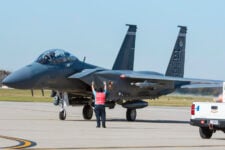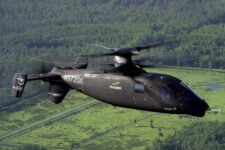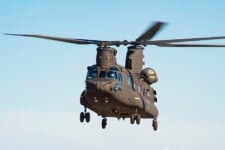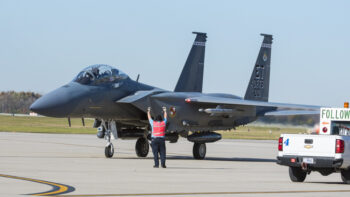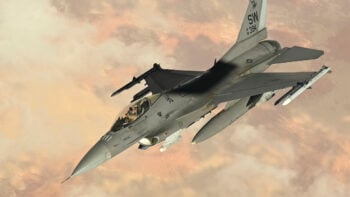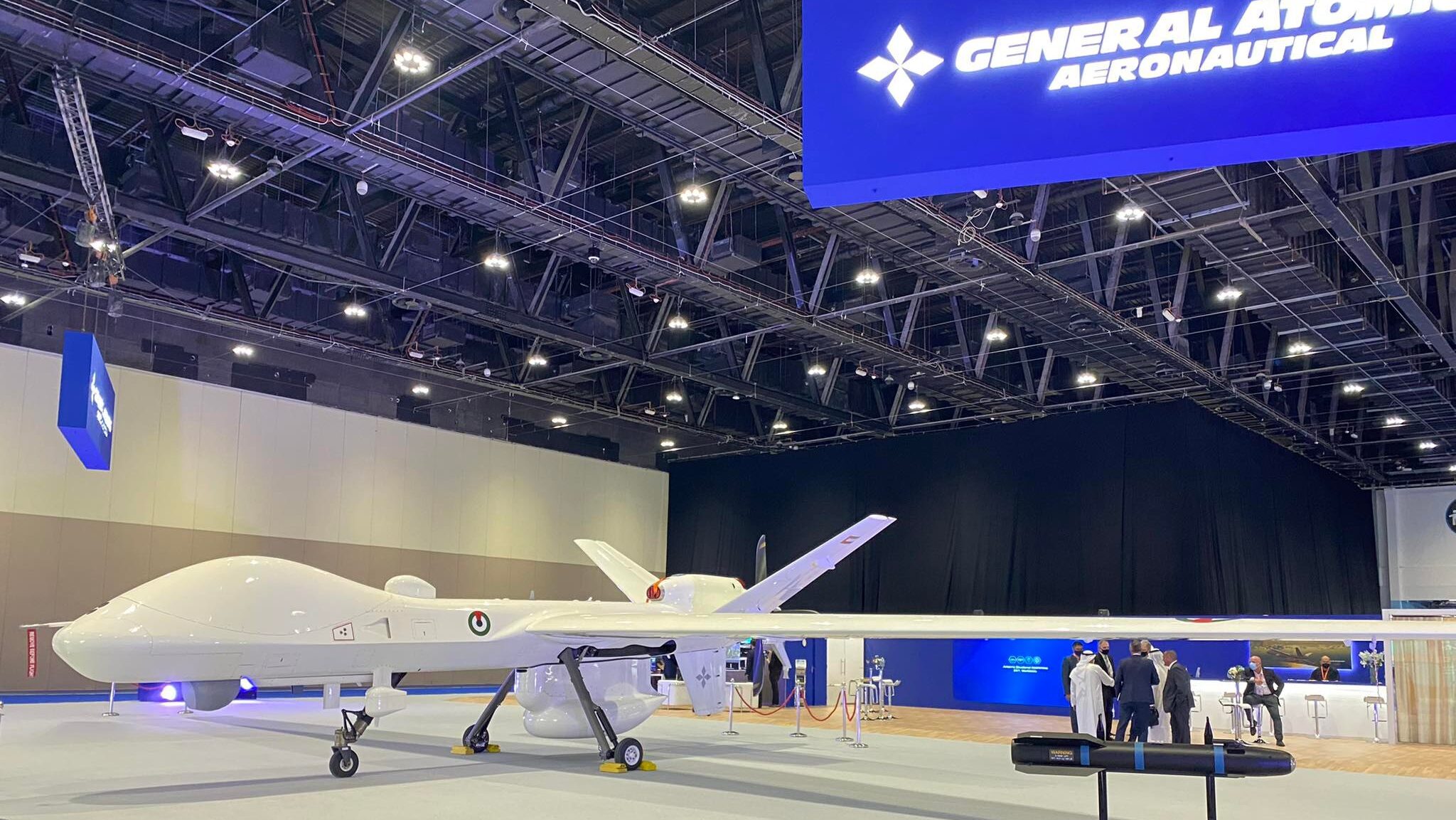
MQ-9B SeaGuardian with Emirati flag symbol at General Atomics booth at UMEX 2022. (Agnes Helou / Breaking Defense)
BEIRUT — General Atomics plans to put missile systems made by the Emirati defense conglomerate EDGE Group to its MQ-9B SkyGuardian unmanned aerial vehicle, as a multi-billion dollar deal between the United Arab Emirates and General Atomics to buy several of the drones remains stalled but alive.
“General Atomics will be working with EDGE to integrate their weapons into the MQ-9B platform,” C. Mark Brinkley, chief marketing and communications strategist at General Atomics told Breaking Defense last month. “There are five different weapons produced by EDGE that we think are a fit for this platform.”
The experimentation comes, however, as the UAE and the US remain at loggerheads over a sale, first approved by the State Department in 2020, of 18 MQ-9B SkyGuardians and associated tech for nearly $3 billion. The Biden administration froze that deal in 2021 along with another much bigger deal for dozens of F-35s for the Gulf nation over concerns related to the UAE’s use of Chinese firm Huawei’s 5G network, and the UAE withdrew its offer of acceptance in response.
RELATED: Will the UAE actually get F-35? How Huawei, Russia factor into the decision
However, this week a US State Department spokesperson told Breaking Defense that the deal for the MQ-9s and F-35s is not dead.
“The proposed sale of F-35 aircraft, MQ-9 Unmanned Aerial Vehicles, and munitions remains on the table,” a State Department official told Breaking Defense on October 31. “We have a continuing and robust dialogue with the UAE on these sales. We remain committed to them, even as we continue consultations to ensure that we have a clear, mutual understanding with respect to Emirati obligations and actions before, during, and after delivery.”
At the UMEX defense show in Abu Dhabi in February 2022, a senior General Atomics official said the company was still pushing the MQ-9 sale and hoped to disentangle it from the potentially more controversial F-35 deal.
“We are here to display the aircraft and keep the negotiations moving forward,” David Alexander, General Atomic’s president for aircraft systems, told Breaking Defense at the time. “We are at a stage of negotiations where we are going over the configurations that they (UAE) want, because this can be configured in so many styles to do various missions and so it comes with different capabilities plus a large ground infrastructure.”
At that show General Atomics showed off an MQ-9B SeaGuardian maritime variant with an Emirati flag symbol pasted on its body. (The State Department official declined to discuss the potential of politically separating the MQ-9B and F-35 deals. A spokesperson for EDGE Group declined to comment for this report.)
Whether or not the SkyGuardian sale eventually goes through, analyst Ryan Bohl said the introduction of the EDGE missiles to the platform opens up many possibilities for the conglomerate, including the potential to export those weapons to other countries that fly SkyGuardians.
“UAE missiles on the MQ-9 would be a notable achievement for the Emirates overall defense independence strategy, allowing them to be less reliant on foreign supplies,” said Bohl, senior Middle East and North Africa Analyst at RANE Network. “Though proof of combat concept would be needed, since it’s not certain such systems would be superior to US made weapons.”
He said that if it’s successful, the UAE-made munitions “could give countries that are otherwise hesitant to embrace Western gear alternative supplies.” Though the UAE is “likely to remain constrained and how many missiles it’s able to produce, […] for countries that aren’t facing imminent military threats and might have to be competing for Western arms with places like Ukraine, this could be a viable option.”
It would not be the first time the US-based firm has integrated munitions from another nation with its platforms. The MQ-9 has been loaded up with Paveway and Brimstone missiles made in the UK, for instance.
Bohl said the Emiratis obviously have great need for maritime drone capabilities, particularly with the region being as unstable as it is with the ongoing conflict between Israel and Hamas in Gaza.
“So they are probably entertaining options and trying to see whether or not receiving such drones would come with any political strings from this administration,” he added.
As far as General Atomics is concerned, their relationship with the Emirates go beyond the MQ-9.
Brinkley told Breaking Defense that the firm is invested in UAE and has projects planned in the country that span the most important areas of technological advancement in aerospace.
“I think the biggest key for us is that General Atomics wants to support the UAE’s goal for a future based on sustainability,” he said in mid-October. “And we think that we can be a good partner with them in that effort.”
With the Dubai Air Show only days away, the public may be a step closer to learning more about the MQ-9’s future in the Emirates. And, who knows, the audience may see an actual MQ-9B SkyGuardian equipped with a variety of Emirati munitions.

